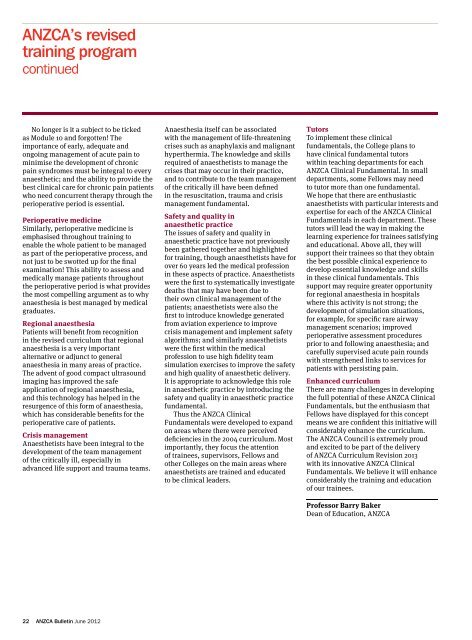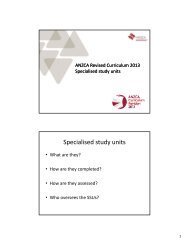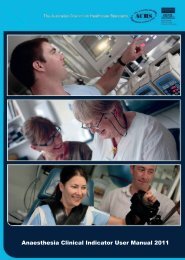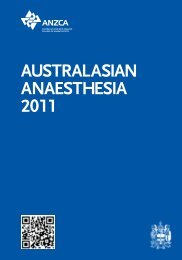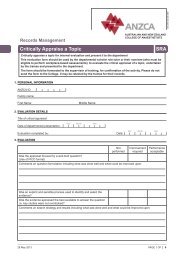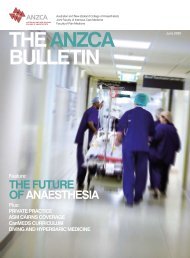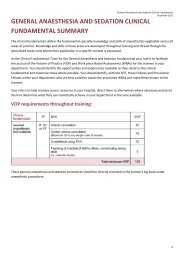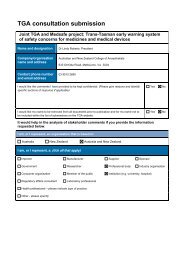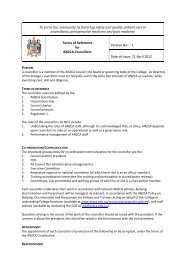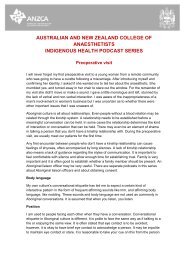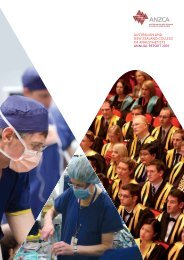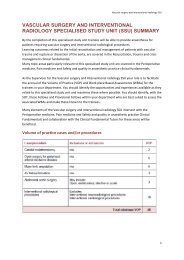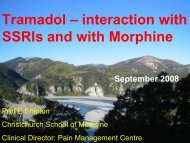ANZCA Bulletin June 2012 - final.pdf - Australian and New Zealand ...
ANZCA Bulletin June 2012 - final.pdf - Australian and New Zealand ...
ANZCA Bulletin June 2012 - final.pdf - Australian and New Zealand ...
- No tags were found...
You also want an ePaper? Increase the reach of your titles
YUMPU automatically turns print PDFs into web optimized ePapers that Google loves.
<strong>ANZCA</strong>’s revisedtraining programcontinuedNo longer is it a subject to be tickedas Module 10 <strong>and</strong> forgotten! Theimportance of early, adequate <strong>and</strong>ongoing management of acute pain tominimise the development of chronicpain syndromes must be integral to everyanaesthetic; <strong>and</strong> the ability to provide thebest clinical care for chronic pain patientswho need concurrent therapy through theperioperative period is essential.Perioperative medicineSimilarly, perioperative medicine isemphasised throughout training toenable the whole patient to be managedas part of the perioperative process, <strong>and</strong>not just to be swotted up for the <strong>final</strong>examination! This ability to assess <strong>and</strong>medically manage patients throughoutthe perioperative period is what providesthe most compelling argument as to whyanaesthesia is best managed by medicalgraduates.Regional anaesthesiaPatients will benefit from recognitionin the revised curriculum that regionalanaesthesia is a very importantalternative or adjunct to generalanaesthesia in many areas of practice.The advent of good compact ultrasoundimaging has improved the safeapplication of regional anaesthesia,<strong>and</strong> this technology has helped in theresurgence of this form of anaesthesia,which has considerable benefits for theperioperative care of patients.Crisis managementAnaesthetists have been integral to thedevelopment of the team managementof the critically ill, especially inadvanced life support <strong>and</strong> trauma teams.Anaesthesia itself can be associatedwith the management of life-threateningcrises such as anaphylaxis <strong>and</strong> malignanthyperthermia. The knowledge <strong>and</strong> skillsrequired of anaesthetists to manage thecrises that may occur in their practice,<strong>and</strong> to contribute to the team managementof the critically ill have been definedin the resuscitation, trauma <strong>and</strong> crisismanagement fundamental.Safety <strong>and</strong> quality inanaesthetic practiceThe issues of safety <strong>and</strong> quality inanaesthetic practice have not previouslybeen gathered together <strong>and</strong> highlightedfor training, though anaesthetists have forover 60 years led the medical professionin these aspects of practice. Anaesthetistswere the first to systematically investigatedeaths that may have been due totheir own clinical management of thepatients; anaesthetists were also thefirst to introduce knowledge generatedfrom aviation experience to improvecrisis management <strong>and</strong> implement safetyalgorithms; <strong>and</strong> similarly anaesthetistswere the first within the medicalprofession to use high fidelity teamsimulation exercises to improve the safety<strong>and</strong> high quality of anaesthetic delivery.It is appropriate to acknowledge this rolein anaesthetic practice by introducing thesafety <strong>and</strong> quality in anaesthetic practicefundamental.Thus the <strong>ANZCA</strong> ClinicalFundamentals were developed to exp<strong>and</strong>on areas where there were perceiveddeficiencies in the 2004 curriculum. Mostimportantly, they focus the attentionof trainees, supervisors, Fellows <strong>and</strong>other Colleges on the main areas whereanaesthetists are trained <strong>and</strong> educatedto be clinical leaders.TutorsTo implement these clinicalfundamentals, the College plans tohave clinical fundamental tutorswithin teaching departments for each<strong>ANZCA</strong> Clinical Fundamental. In smalldepartments, some Fellows may needto tutor more than one fundamental.We hope that there are enthusiasticanaesthetists with particular interests <strong>and</strong>expertise for each of the <strong>ANZCA</strong> ClinicalFundamentals in each department. Thesetutors will lead the way in making thelearning experience for trainees satisfying<strong>and</strong> educational. Above all, they willsupport their trainees so that they obtainthe best possible clinical experience todevelop essential knowledge <strong>and</strong> skillsin these clinical fundamentals. Thissupport may require greater opportunityfor regional anaesthesia in hospitalswhere this activity is not strong; thedevelopment of simulation situations,for example, for specific rare airwaymanagement scenarios; improvedperioperative assessment proceduresprior to <strong>and</strong> following anaesthesia; <strong>and</strong>carefully supervised acute pain roundswith strengthened links to services forpatients with persisting pain.Enhanced curriculumThere are many challenges in developingthe full potential of these <strong>ANZCA</strong> ClinicalFundamentals, but the enthusiasm thatFellows have displayed for this conceptmeans we are confident this initiative willconsiderably enhance the curriculum.The <strong>ANZCA</strong> Council is extremely proud<strong>and</strong> excited to be part of the deliveryof <strong>ANZCA</strong> Curriculum Revision 2013with its innovative <strong>ANZCA</strong> ClinicalFundamentals. We believe it will enhanceconsiderably the training <strong>and</strong> educationof our trainees.Professor Barry BakerDean of Education, <strong>ANZCA</strong>22 <strong>ANZCA</strong> <strong>Bulletin</strong> <strong>June</strong> <strong>2012</strong>


